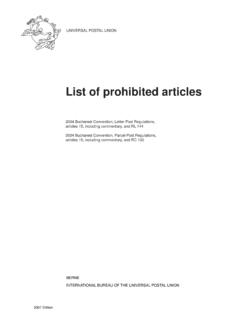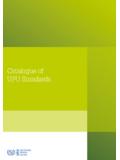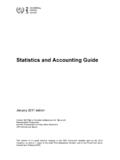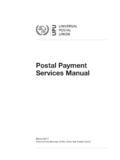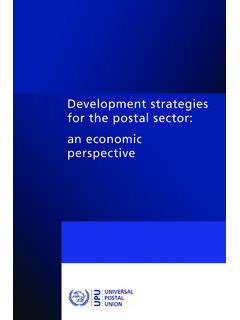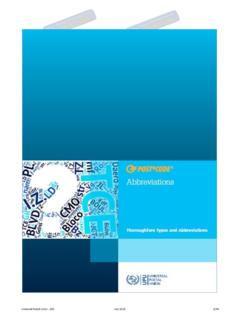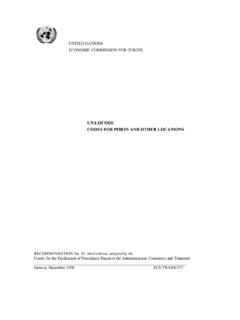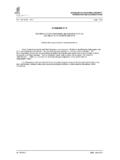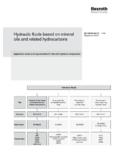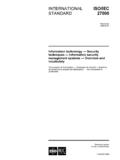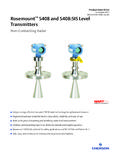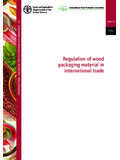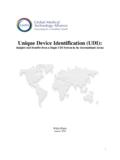Transcription of Registration of international mail processing centres
1 Data definition and encoding standardsS34 Registration of international mail processing centresS34 9 UPU 2017 All rights reserved i UPU status: 0 Date of adoption at this status: 26 November 1999 Date of approval of this version: 22 February 2017 Registration of international mail processing centres UPU standards are updated in their entirety. Each update results in a new version, indicated by the version number following the number of the standard. Before using this document, please check in the Catalogue of UPU Standards that it is still valid. The Catalogue is freely available on the UPU website at S34 9 ii UPU 2017 All rights reserved Disclaimer This document contains the latest information available at the time of publication. The Universal Postal Union offers no warrants, express or implied, regarding the accuracy, sufficiency, merchantability or fitness for any purpose of the information contained herein. Any use made thereof is entirely at the risk and for the account of the user.
2 Warning intellectual property The Universal Postal Union draws attention to the possibility that the implementation of this standard might involve the use of a claimed intellectual property right. Recipients of this document are invited to submit, with their comments, notification of any relevant rights of which they are aware and to provide supporting documentation. As of the date of approval of this standard, the Universal Postal Union had not received such notice of any intellectual property which might be required to implement this standard, other than what is indicated in this publication. Nevertheless, the Universal Postal Union disowns any responsibility concerning the existence of intellectual property rights of third parties, embodied fully or partly, in this Universal Postal Union standard. Copyright notice UPU 2017. All rights reserved. This document is copyright-protected by the UPU.
3 While its reproduction for use by participants in the UPU standards development process is permitted without prior permission from the UPU, neither this document nor any extract from it may be reproduced, stored or transmitted in any form for any other purpose without prior written permission from the UPU. Requests for permission to reproduce this document for other purposes should be addressed to: Universal Postal Union Standards Programme Box 312 3000 BERNE 15 SWITZERLAND Tel: +41 31 350 3111 Fax: +41 31 350 3110 E- mail : Reproduction for sales purposes may be subject to royalty payments or a licensing agreement. S34 9 UPU 2017 All rights reserved iii Contents Foreword .. iv Introduction .. v 1 Scope .. 1 2 Normative references .. 1 3 Terms and definitions .. 2 4 Symbols and abbreviations .. 2 5 international mail processing centres .. 2 6 Identification and attributes of IMPCs .. 2 IMPC code .. 2 12- and 35-character IMPC names.
4 3 3-character IMPC operator code .. 4 IMPC function .. 4 mail flows .. 4 mail categories outbound .. 4 mail categories inbound .. 5 mail classes outbound .. 5 mail classes inbound .. 5 Special type .. 5 Bilateral agreement requirement .. 5 Valid from .. 5 Valid 5 Special restrictions .. 5 7 Registration of new IMPCs .. 6 Application procedure .. 6 processing of 7 Allocation of IMPC codes .. 8 8 Modification of IMPC registrations .. 8 Notification procedure .. 8 processing of updates .. 9 9 Closure (de- Registration ) of IMPCs .. 9 Notification procedure .. 9 processing of closure notifications .. 10 De- Registration by the UPU .. 10 10 Publication of IMPC Registration data .. 10 Publication as code list 108 .. 10 E- mail publication .. 11 11 Use of IMPC Registration data .. 12 12 Contacts .. 12 Annex A (normative) IMPC register update request (creation, modification or closure) .. 13 Bibliography .. 15 S34 9 iv UPU 2017 All rights reserved Foreword Postal services form part of the daily life of people all over the world.
5 The Universal Postal Union (UPU) is the specialised agency of the United Nations that regulates the universal postal service. The postal services of its 192 member countries form the largest physical distribution network in the world. More than 5 million postal employees working in over 660 000 post offices all over the world handle an annual total of 434 billion letter-post items in the domestic service and 5,5 billion in the international service. More than 6 billion parcels are sent by post annually. Keeping pace with the changing communications market, postal operators are increasingly using new communication and information technologies to move beyond what is traditionally regarded as their core postal business. They are meeting higher customer expectations with an expanded range of products and value-added services. Standards are important prerequisites for effective postal operations and for interconnecting the global network.
6 The UPU's Standards Board develops and maintains a growing number of standards to improve the exchange of postal-related information between postal operators and promotes the compatibility of UPU and international postal initiatives. It works closely with postal handling organisations, customers, suppliers and other partners, including various international organisations. The Standards Board ensures that coherent standards are developed in areas such as electronic data interchange (EDI), mail encoding, postal forms and meters. UPU standards are drafted in accordance with the rules set out in the "General information on UPU standards" and are published by the UPU international Bureau in accordance with that publication. This is the ninth version of the document. Changes relative to the previous version, which are not marked, are: review of IMPC attributes, notably with the following new attributes: 3-character IMPC operator code, bilateral agreement requirement, special type, inbound and outbound mail categories (in replacement of a single attribute " mail categories"), inbound and outbound mail classes (in replacement of a single attribute " mail classes"); renaming of attribute "restrictions" to "special restrictions"; addition of reference to S62, international mail processing centres : assignment and use of operator codes; removal of the attribute concerning support of code list 161 (aggregate mailstream segregation codes); review of the Registration form to cover all changes above and facilitate proper completion; modified rules for the processing of IMPC applications.
7 S34 9 UPU 2017 All rights reserved v Introduction For the purposes of transfer of responsibility between different organisations, inter-operator mail is organized into despatches that are exchanged in accordance with despatch agreements between designated mail processing centres referred to as international mail processing centres (IMPCs). For accounting and operational purposes, it is essential that IMPCs be unambiguously identified in all communications between postal handling organisations and that all parties involved are aware of the categories and classes of mail that can be handled in any given IMPC. To fulfil this need, the UPU has developed a mechanism for uniquely identifying IMPCs, and a process for the Registration and publication of their processing capabilities. This standard defines the structure of the identification code used and specifies the procedures for the allocation of codes and for the Registration , update and publication of IMPC data.
8 The complete list of registered IMPCs is published in UPU code list 108, accessible via the UPU website ( ); extracts may be made available as paper printouts on an exceptional basis. S34 9 UPU 2017 All rights reserved 1 Data and Code Definition standards Registration of international mail processing centres 1 Scope This standard provides for the maintenance, by the UPU, of a register of international mail processing centres (IMPCs), with each IMPC being identified by a UPU-allocated six-character IMPC code, and for the publication of extracts from this register as a UPU code list, code list 108. It defines the details to be maintained, for each IMPC, in this register and specifies restrictions on the use made of these details. The standard further defines the requirements, on IMPC operators, for the Registration of IMPCs and for the communication, to the UPU, of any changes in the details of them which are maintained on the register.
9 Procedures for dealing with Registration applications and modifications are also specified. Although these procedures include provision for limited consistency checking on the part of the UPU, it is stressed that the information in the register and published in UPU code list 108 is provided by individual postal handling organisations, and as such is the responsibility of those organisations. The UPU cannot be held responsible for any inaccuracy in the information provided to it. Finally, the standard deals with de- Registration and the circumstances in which it may occur. The standard is primarily intended to apply to mail processing facilities that are involved in the creation, transit routeing and/or receipt of despatches exchanged under UPU regulations, and application of the standard to these facilities is mandatory. Its application to mail processing centres that are involved in the bilateral interchange of mail ( interchange in accordance with bilateral or multilateral agreements that fall outside the scope of UPU regulations) is strongly recommended, but not required.
10 The standard applies in all cases in which coded representation is required for names of IMPCs, for use in information exchange between postal handling organisations. The standard was put in place strictly to facilitate international postal operations, not to regulate them. The allocation of an IMPC code to a processing centre occurs on receipt by the UPU international Bureau (IB) of a valid request from a postal handling organisation, and in no way implies UPU authorization or agreement that the designated processing centre may be used for the sending or receiving of mail under the rules of the UPU Convention, or at 2 Normative references The following referenced documents are indispensable for the application of this document. For dated references, or references to a version number, only the edition cited applies. For undated references and cases where there is no reference to a version number, the latest edition of the referenced document (including any amendments) applies.


